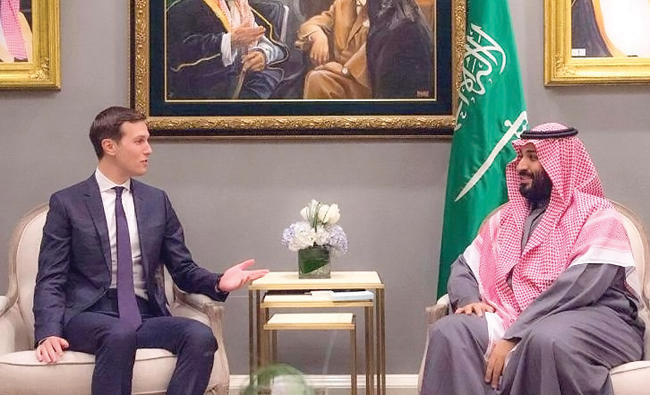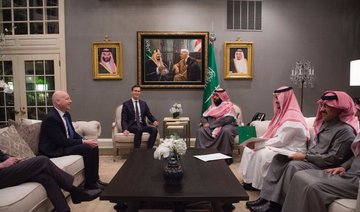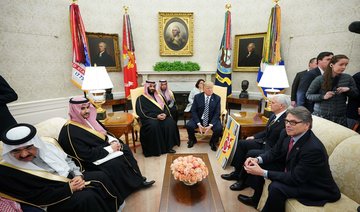WASHINGTON: Photos of Crown Prince Mohammed bin Salman and Donald Trump meeting at the White House were published on the front pages of The New York Times and The Wall Street Journal on Wednesday, in what some commentators saw as a public relations coup for Saudi Arabia.
The New York Times headlined its story: “Saudi Prince’s White House Visit Reinforces Trump’s Commitment to Heir Apparent.”
The crown prince has dominated a significant amount of the capital’s attention this week and the glowing headlines would have been warmly welcomed by the Kingdom’s officials.
“The early judgment appears to be that US opinion hopes that MBS’s social and economic reforms will succeed, for the benefit of the Kingdom and the wider Middle East,” said Simon Henderson, director of the Gulf and energy policy program at the Washington Institute for Near East Policy.
Trump was effusive in his welcome of the Saudi royal, in remarks that received wide press coverage in the US.
The US president hailed the US-Saudi relationship as “probably the strongest it has ever been.”
“We understand each other,” Trump told reporters. “Saudi Arabia is a very wealthy nation, and they’re going to give the United States some of that wealth, hopefully, in the form of jobs, in the form of the purchase of the finest military equipment anywhere in the world.”
The US public has been suspicious of Saudi Arabia, largely since the attacks of 9/11. In reality, the two countries have long been allies, and working in close cooperation on issues of security and economics.
The Kingdom has been trying to remake its public image in the United States to reflect that fact.
Dov Zakheim, board director at the Atlantic Council, a leading US think tank, said Saudi Arabia would be delighted with the coverage.
“All of this is a clear public relations victory for Saudi and for MBS,” he said.
Zakheim cited an interview with the crown prince on the CBS flagship “60 Minutes” show on Sunday. The show, known for its critical and hard-hitting investigations, gave a highly favorable portrayal.
“There is a change there. It’s not a major change, but it’s enough of a change for American policymakers to feel comfortable doing what America has been doing for years, which is cooperating (with Saudi Arabia),” Zakheim said.
Trump and the crown prince held talks in Washington on Tuesday. Appearing together before the press, Trump talked at length about arms sales and business deals between Saudi and the US, which he said would create jobs for American workers.
The crown prince seemed relaxed and happy as he and the US president fielded questions from the media in a televised appearance.
“The optics are all good,” said Jim Smith, a former US ambassador to Saudi Arabia under President Barack Obama.
But he expressed concern that Trump’s preoccupation with weapons deals was not the best way for the US to support Saudi reform efforts.
“All the White House wanted to talk about was defense sales and the political message of jobs in the US,” he said.
On Tuesday evening, the crown prince had dinner with Jared Kushner, the president’s son-in-law and senior adviser, together with Michael Bell, a senior National Security Council official, and Jason Greenblatt, Trump’s Middle East peace envoy.
They talked about Trump’s hopes to start a new Middle East peace process. Experts agree there is little appetite among the Israelis and Palestinians for talks on terms set by the Trump administration.
Public relations successes aside, confusion remained about the exact outcome of the US-Saudi talks within the US foreign policy establishment and among Middle East watchers in the US capital.
“How does one measure success in Washington? The meeting with President Trump appeared to go well, but the president is fickle,” Henderson, of the Washington Institute for Near East Policy, said in an emailed response to questions from the Arab News.


Saudi crown prince woos US media with promises of reform
Saudi crown prince woos US media with promises of reform

Crown prince, Qatar Emir discuss regional developments in phone call

RIYADH: Crown Prince Mohammed bin Salman spoke on the phone on Thursday with Sheikh Tamim bin Hamad Al-Thani, Emir of Qatar.
During the call, the two leaders reviewed the fraternal relations between Saudi Arabia and Qatar and discussed ways to strengthen and develop cooperation, in addition to exchanging views on regional and international developments, the Saudi Press Agency reported.
© 2026 SAUDI RESEARCH & PUBLISHING COMPANY, All Rights Reserved And subject to Terms of Use Agreement.













